|
In picture editing, the 'slip' tool allows you to change the first and last frames of a shot while retaining its length within the sequence. The selected shot 'slips' like the turning of a steering wheel so that the start and end points change but the shot stays the same length. You cannot do that with a finished movie. A finished movie starts at its first frame and ends on its last frame. You have no knowledge of events that occurred before or after unless explicitly specified in the narrative. A Day in the Death of Joe Egg is the first movie for some time that I was desperate to 'slip'... to see what happened beyond the ending. The beginning is covered by flashbacks and somewhat surreal fantasy sequences. What I wanted to know was... spoiler territory where our footfalls will find no purchase. A film is imprisoned by its own beginning and ending and it set me thinking that it's a small miracle that movies work at all. Imagine. In under two hours or so you have to set up a world, make us understand the rules of that world, show us what's at stake, develop people with some nod to reality and then make us care. Joe Egg ticks all these boxes. With a first class and at times shocking script by Peter Nichols (whose life and relationships the original play is heavily drawn from) and beautifully intelligent and sympathetic direction by Peter Medak, the film is a harrowing delight.
There's a definite frisson involved in reviewing a film whose title has managed to squat in my mind for years but the actual film and original play has escaped my attention... It's a little like the unread classics (War and Peace etc.) that I'm hoping I will get to read once involuntarily immobilised and needing stimulating input. I'd never seen the film and the title told me nothing about the content. I wanted to see it with no preconceptions. I resisted any research until I had watched it and taken it in from the very unusual position of virtual cinematic virginity. I'd heard of a stage production with Eddie Izzard but paid it just passing interest after having moved from London. Its plot couldn't be easier to grasp. A young couple in the late sixties have had a child and a few months down the line, they find out their daughter has cerebral palsy, a hideous disorder that has rendered Josephine a virtual vegetable. She has severely limited, random movement and in effect her mother and father have to do her living for her. Her nickname 'Joe Egg' was a generic name for someone with nothing to do, a name that her father thought suited her. That's in itself pretty dark. The child inadvertently drives a wedge between both parents who use dark humour to offset the emotional and physical prison they are both occupying. At first they find great solace in each other and through fantasy and shifts in time, we get a rounded picture of how the marriage is dealing with what must be every parent's nightmare. Amor Vincit Omnia... Love conquers all... Wonder Woman may have come to that conclusion but does it? Does it really?
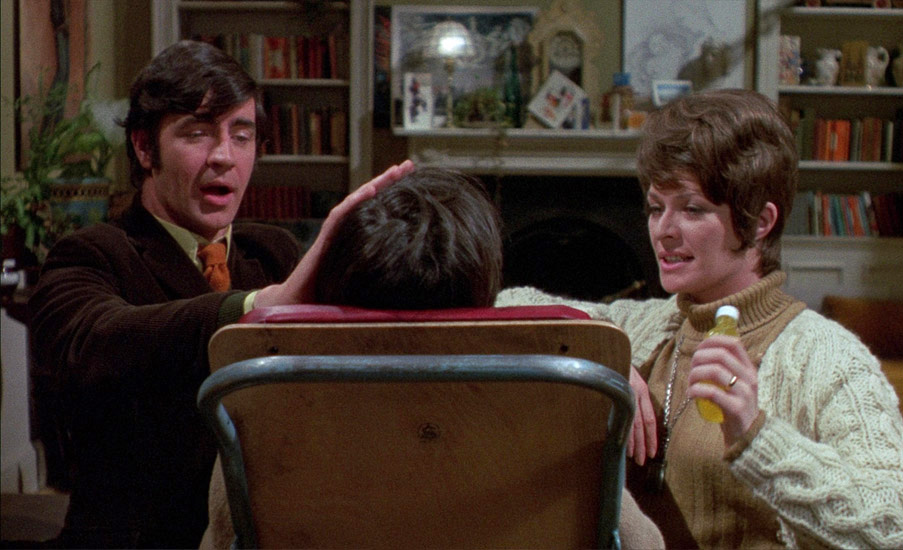
At its root, the film is an examination of love; selfless and devoted parental love, romantic and sexual love and the ideal of love against which most other kinds are unfairly judged and compared. If like me, you find the lyrics of most love songs hilarious, then you may also be able to ask yourselves a few awkward questions. Harry Nilsson sang, "I can't live, if living is without you..." I love the song but the lyric has to promote love as the ultimate human emotion so you have to throw a few heavy mountains at it to give it some weight. I also love the title of a Cynthia Heimel book (and of course all of her books are wonderful) If You Can't Live Without Me, Why Aren't You Dead Yet? In fact there's an argument that most love song lyrics have to fashion utterly ludicrous similes and metaphors to reinforce love's power and in so doing produce face palms for the reasonable among us. How about "Everything I do, I do it for you..." If you think about that for a second you go "Eurgh..." God, not everything? "You say it best when you say nothing at all..." Just shut your mouth and we'll be fine. I think I have to put reason back in its box now. If you have a mind to, you can examine your own relationships and realise that at the time of a blossoming romance, everything feels pre-ordained, divinely destined, more special than anyone has ever felt etc. Once a relationship settles down, whoever you really are starts to emerge. It's that love that binds people together over time that many people hail as the kind that's the real thing. But as the Joker showed us in The Dark Knight, it takes very little for civilisation to be stripped from the human being. In Orwell's 1984, A romantically smitten Winston Smith is taken to Room 101 to face his worst fear and he cracks asking his torturer to spare him and offering up his girlfriend for rat-based, face eating horror.
So what puts a dent in real love? When it is judged up against the ideal and when tragedy strikes. I have no doubt that healthy people survive many set backs but the daily grind of constant care for a human being whose life is a series of grunts, fits and effluence will wear anyone down. It's tough enough being a parent, all that mess either end for a few years but we have the assurance that if we are lucky, that helpless, smiling, limb-flailing blob will soon become independent. Cerebral palsy sufferers live normal life spans. Think about that; dressing and undressing, changing nappies and spoon-feeding someone every day into adulthood and beyond. That requires a kind of practical love that few of us could hope to practise and stay sane. And how does anyone afford it, financially, physically and emotionally? Yes, the love of a child is one of those significant emotions in anyone's life and counts for a great deal if that child is compromised. But questions have to be asked and hard answers need to be considered. For the first half of the film, we find out that Bri (Alan Bates) is an ineffectual comprehensive schoolteacher whose libido seems to be clawing for continual satisfaction. It's a release in more than one sense. In the throes of sex, he can be briefly free of the prison that is the rest of his existence. His wife Sheila (Janet Suzman) is happy to be the source of his infatuation but they both have a more important person to concern themselves about. Josephine is wheeled in, slumped over like a corpse and it's a real shock if like me, you knew nothing about the film's content. Bri and Sheila are matter of fact in their care and use humour to take the edge of the unenviable situation they're in not to mention poor Josephine's plight. On the face of it, the film could have been relentlessly grim but the right questions are asked. What we are all dancing around at first is the question "Are we capable of passing judgement on the quality of another's life and what must we conclude about that life?" If in hospital in a life-threatening situation, would both Bri and Sheila agree to a DNR (a 'do not resuscitate' order) if things go south? One might, the other perhaps not. But there is no life-threatening situation. There is no life, hence the Death of the title. Bri and Sheila are simply taking their time to lay her to rest, in effect their entire lives. And beyond.
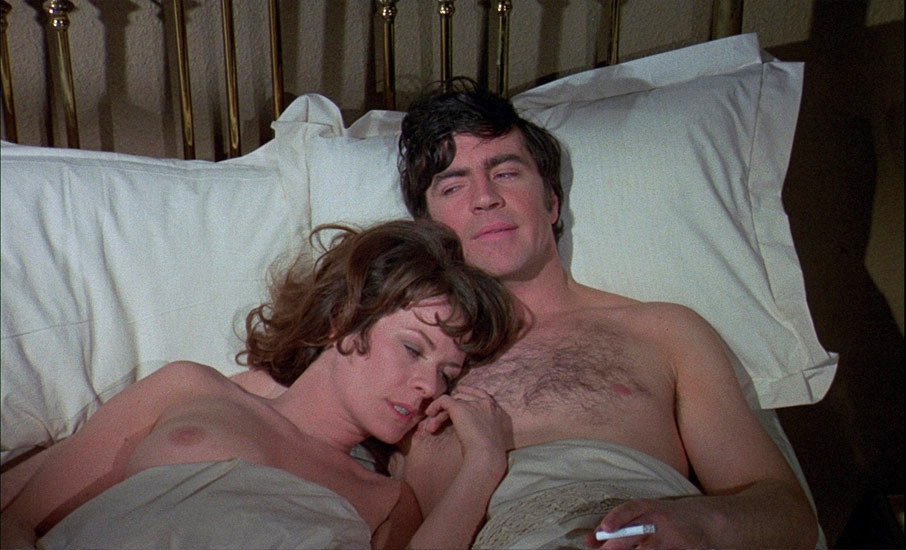
The film is a remarkable one for a number of reasons and the first five of them is the cast. Alan Bates plays Bri as a man constantly questioning why fate is landing all these body blows. Yes, he's charismatic and attractive but he's also almost comically but darkly bemused by the cards he's been dealt. In her first film role, Janet Suzman is mesmeric as Sheila. She's comfortably topless in a film where this is required but again she represents a desirable creature and not a source of titillation. She's utterly convincing as a mother thrust into the role of total carer and her chemistry with Bates is manifest. The beach scene is a highlight for its extraordinary balance between carefree loving and surrealistic horror. Playing the mostly inert sufferer, daughter Josephine, is Elizabeth Robillard and despite what many may think, this role is a difficult one to pull off and she does it beautifully and in some scenes heart-wrenchingly. The roles of the 'every-couple' who come in to the family's lives in the second half are played by Peter Bowles as Freddie and Sheila Gish as the ghastly Pam. Bowles gets to show his love for the stricken couple by accepting their humour but then not being able to stop himself from asking the harder questions, one of which talks about having a "a real baby," - meaning a healthy baby - but the words still sting, paper-cut on tongue. It's a passing irony that Bowles – cast for his neon-obvious Englishness - is probably best known as the foil to Penelope Keith in BBC TV's To The Manor Born playing a Czech entrepreneur. Just as an aside, the final episode of the first series of the programme garnered 23.95 million viewers. Wow. A hold over from the stage performances is Joan Hickson as Bri's mother, the chain-smoking Grace, a far cry from her signature role as TV's Miss Marple. She's the comic relief in an already dangerously funny film.
Director Peter Medak shows great choices in his direction. He shoots Bates from behind the bars of a bedstead as Bri talks to his daughter whom he's just deposited in bed. As he brings up the dreaded subject of her being better off dead, the camera movement 'frees' Bri from the bars of the bedstead. He's now free from the prison but only in the contemplation of the death of his daughter. It's subtle but it shows the working of a real creative mind behind what we are experiencing. There's a shot from the back of a hamster cage that is far less subtle but we can't have everything. He has Suzman, in a quiet but startling way, suddenly flick her eyes up at us, breaking the fourth wall and delivering a soliloquy. But then we realise it's a mirror and what we think just happened, didn't. Directors love mirrors. And I love being taken in by a directorial trompe l'oeil. The film gets much darker but I'd rather leave that to you to discover. As I said, I would love to know what happens after the film ends but I'll just have to use my imagination. A Day in the Death of Joe Egg is captivating social issue cinema at its best.
A Day in the Death of Joe Egg is presented in its original 1.66:1 aspect ratio and it's scrubbed up very nicely. It was a bit of a thrill to see the original BBFC (British Board of Film Censors) red X certificate given how much I yearned to see that particular image before I was 18. In the feature, there are some close ups of faces that made me go "Wow!" but that may be more to do with the facial features of the actress rather than the lighting. Bristol at night has never looked more American (it's the neon) and despite the considerable efforts of the filmmakers, Joe Egg is room bound for most of its running time betraying its theatrical origins. So we are indoors with chatting people mostly all brightly lit and the film's contrast ratio is good (night scene blacks are velvet-smooth and interior black areas are rendered suitably inky). Colour reproduction is excellent and I still marvel at that extra detail the format gives us, the pattern and weave of Bates' jacket and so on. Everyone seems so alive, the close ups so vibrant.
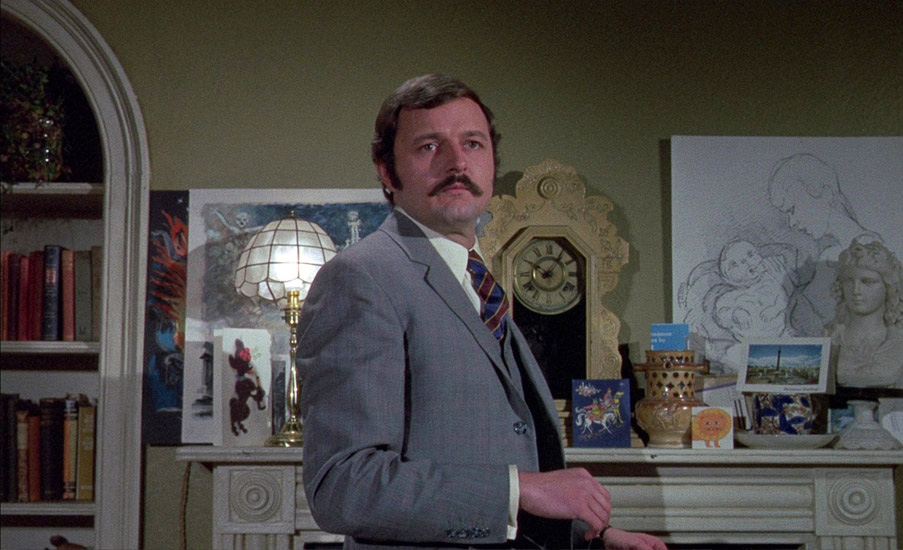
The mono soundtrack is spot on with no discernable hiss and not a dropped word or age-related handicap. There are optional subtitles for the deaf and hard of hearing.
Audio commentary by director Peter Medak
The self-confessed 'behind the scenes' guy Sam Dunn introduces Hungarian born director Peter Medak. This is a fascinating commentary from a man who adored English culture, was stifled by his own and as a young man came to the UK and got well connected fast through his famous opera singer aunt. This is one hundred per cent interesting because he's had an amazing career and exudes passion for what he does despite his advanced years - 79 and still working. Some gems from his commentary; advice to always start at the bottom in the film business, his seeing Hamlet with Olivier which stunned him before all English speaking media was banned in his home country. He actually said "I'm not sure if the Americans can take the child's performance..." which I found telling. There's the lovely insight of all three of his wives listening in to a conversation between her director husband and a producer, each exactly the same whoever's on the other end of the phone. Always the same concerns, "Not enough money or time and the schedule's wrong..." And this was eye opening after revealing that he's not a fan of scattershot editing... In US TV, "They can't wait for the director to leave..." Sounds like old Hollywood. "The public doesn't want to see movies like Joe Egg... Not true!" Roman Polanski was asked what his motivating passions were to take on the following in his oeuvre; Repulsion, Cul de Sac and Chinatown. "I needed the money..." he said. He's hugely complimentary of his cast and his editor, the great Ray Lovejoy, the editor of cinema's most famous cut (bone to spaceship in 2001). Medak refused to direct A Star is Born with two singers in the leads. I bet that smarted when it made a ton of money. I'll end with his passion still way up there... Of Bates and Suzman, he simply repeats the word "Brilliant!" three times. Lovely stuff.
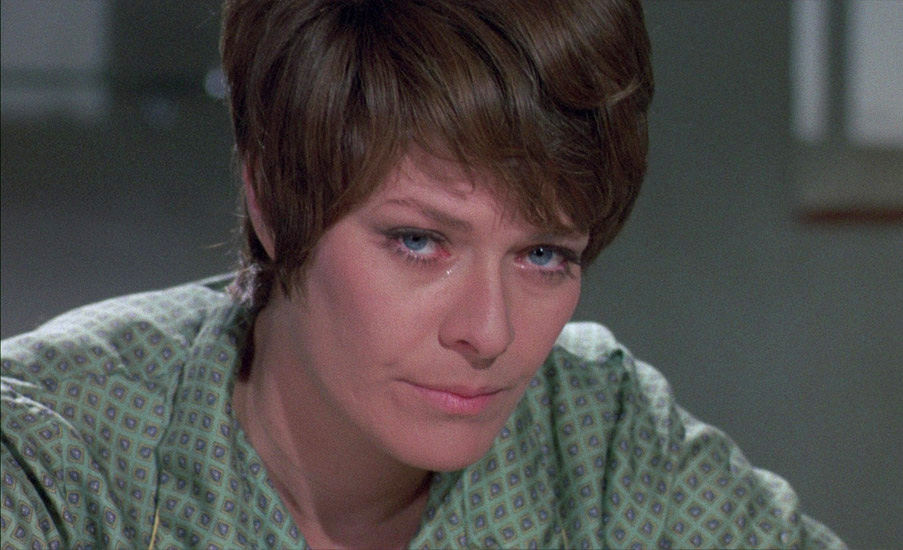
Remembering The Day; Interview with actor Janet Suzman (2017) (17' 30")
Suzman, looking terrific for 78, explains that the English use humour just to get through the day – that's life. She recalls being present at a dinner with three of the greatest pianists the world has ever known and music was the last thing they spoke of, fixating on shared maladies, sprained wrists and the like, hazards of the job. She's complimentary of her Hungarian director, "Just one more, dah-ling!" She mentions the film illustrates the "bone-shaking truth of a marriage falling apart – not an easy film to make." She's also searingly honest in saying that "...most often actors have to do utter crap." But the bit that resonated for me was one of the reason I loved filmmaking when I started out. She tells us that you get thrown into intimate contact with a bunch of strangers for three months and then it's goodbye. My answer to that is where else are you ever going to find the experience contained within those three months? Film sets are emotionally heightened places and I'd fight tooth and nail to work on them. A fine extra.
From Stage to Screen; Interview with playwright and author Peter Nichols (2017) (19' 43")
Nichols is known for not being a fan of Medak's interpretation of his play. Fair enough. He finds it too sentimental. He's looking at the film from his own perspective (saying it's funnier on stage) but there are a few telling morsels. He feels Albert Finney should have been the lead (he'd played it on Broadway) as Bates, he felt, was given too much encouragement to 'fool about'. He also talks of his alarm when Columbia turned down his offer to do the film screenplay fashioning the work for cinema. Columbia merely stated that they bought the play and that will do. In the booklet's first article, it states that Nichols did write the screenplay based on his play, one which he did 'open' out for cinematic treatment.
Original theatrical trailer (3' 06")
With no defining or clarifying voice over to detract, this effective trailer hits all the right beats if being a little too focussed on the negative fate of Joe (Elizabeth Robillard). In fact if you see this trailer knowing nothing of the film, you could only conclude that Bri (Alan Bates) is a child-killing monster... Be assured there are fantasy sequences in the film but the trailer can't tell you that...
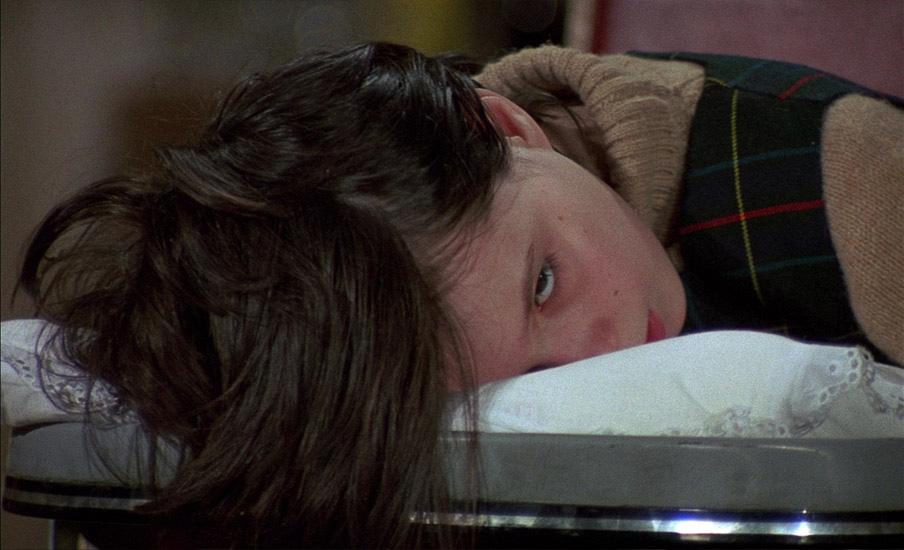
Image gallery: on-set and promotional photography
There is no indication on the Special Features main menu of the Blu-ray that this Extra is present unless it's an Easter egg somewhere.
Limited edition exclusive booklet with a new essay by Marcus Hearn, an overview of contemporary critical responses, and historic articles on the film
Maurice Hearns' informative essay gives us the historical context of Joe Egg and how things were in a state of extreme upheaval in the British film industry at the time. His research is extremely satisfying filling in the gaps about the production that the extras only touched upon. The second piece is taken from Peter Nichols' autobiography and diary entries, and in the centre of the first paragraph he poses the question that remained metaphorical but must have been on everyone's mind concerned with Abo (Abigail, the real 'Jo'). It's hard-hitting stuff and director Medak comes in for some sharp stick but then plays are the playwright's children... I can understand his displeasure if not actually share or condone it. The third piece features the Citizens' Theatre Literary Advisor, Tony Paterson and how the play finally reached the stage after much cutting and controversy. Colin Ford's 1972 Monthly Film Bulletin review is the fourth and final piece. He's not too impressed by the film and perhaps spoilers weren't seen in such a bad light in 1972 (when did the explicit idea of spoilers start I wonder?), but he gives away the ending almost in a perfunctory manner. In doing so, he also asks the question I wanted answering in the first paragraph of my review... No spoilers. So keep clear of this review until you've seen the film.
A Day in the Death of Joe Egg is a dramatic tour de force and an edgy and near the knuckle examination of a relationship in crisis. In dealing with disability (and profound disability at that) it forces the audience to ask some pretty unpalatable questions. The answers to these are even more so. It evokes another television play Joe Egg's even edgier half-sibling, the ground-breaking piece that is Dennis Potter's Brimstone and Treacle. Brilliant, finely judged performances and classy, thoughtful direction makes this disc jump on to your Blu-ray shelf. Highly recommended.
|